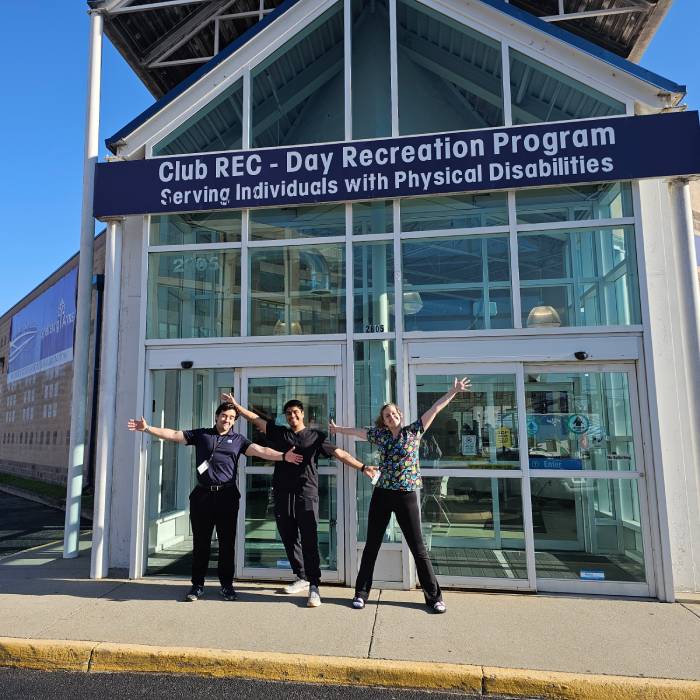Student pro bono PT clinic CARES for community
 For uninsured patients who have nowhere to turn, the CARES Clinic offers something rare: a chance for a better quality of life.
For uninsured patients who have nowhere to turn, the CARES Clinic offers something rare: a chance for a better quality of life.
Run by VCU Physical Therapy students, the clinic provides free, high-quality physical rehabilitation to those who would otherwise go without. The integrated team blends hands-on education, compassion and community service into their approach.
“We exist to serve people who have no other option,” said Drew Biegner, a second-year student and board coordinator for CARES, which officially stands for Community Accessible Rehabilitative Exercise Services. “Not people with poorly used insurance – people with no insurance. And we don’t turn anyone away.”
Founded in 2016, the fully student-run nonprofit clinic is backed by the guidance of VCU faculty and licensed volunteer physical therapists, who oversee treatment plans. CARES operates out of the Sheltering Arms Institute location near Scott’s Addition two evenings a week. While the limited time available for the clinic limits the size of the caseload, that volume ensures each patient receives individualized attention – layered with resources, coordinated care and even interpretation services.
Learning while leading
Each CARES visit is staffed by a team with a licensed physical therapist, a second-year student who leads the treatment, a first-year student who documents the session and a student board member who manages clinic operations. The level of professional supervision ensures quality care while giving students hands-on experience before their official clinical rotations begin in their third year.
“Physical therapy is never a perfect science,” Biegner said. “You adapt. You think on your feet. Sometimes a child comes in with ‘in-toeing’ and it turns out to be ‘out-toeing.’ You adjust your plan in real-time – and that’s where the learning happens.”
In the last year, the CARES team saw over 20 patients who otherwise would have gone without therapy services, with most requiring multiple appointments. Every discharge is celebrated as a success because improvements in mobility, function and quality of life are common.
“We’re proud of that,” said Bianca Cabral, another second-year student. “And our patients are incredibly patient with us. They understand this is a teaching clinic.”
Running on passion and planning
Every Monday, the clinic’s 14-member student board meets to triage cases, determining which patients to see according to clinical needs, urgency and availability of professional partners who can oversee those cases, such as wound care. The board also leads the clinic’s fundraising events (such as its annual 5K and pickleball tournament, which raised more than $4,000 this year). Monday night board meetings are a mix of logistics and advocacy, since students often are juggling coursework, part-time jobs and family responsibilities.
Participating with the CARES Clinic gives future physical therapists great leadership and collaboration experiences at an early stage, according to Chad Taylor, DPT, assistant professor who serves as the primary faculty sponsor. “It’s an amazing type of hands-on learning that happens in a real clinical setting,” he said. “This is an innovative and unique program that allows our students to provide PT services to those who could have not accessed it otherwise.”
That mission keeps students coming back.
“We all have different reasons for being here,” Cabral said. “But the one thing we share is our passion. That’s what keeps the clinic running.”
For Biegner, CARES allows him to continue his family’s legacy service, seeded by his father, a Lutheran minister, who worked in refugee housing and disaster relief. “I’ve seen the power of helping people up close,” Biegner said. “And I believe – deeply – that health care should be a right. This clinic is my way of giving back.”
More than just PT
The clinic’s patients often find their way through Access Now, a local service that connects uninsured people to specialty care. Once their cases are reviewed and accepted, CARES works to schedule them, often coordinating transportation through Uber Health, especially for families who only have one car or patients who cannot drive.
Most CARES patients are Spanish-speaking, making this outreach program very personal for Cabral.
“My parents immigrated from Mexico and didn’t have insurance until I was a teenager,” said Cabral, who serves as a patient advocate. “I watched them try to navigate this incredibly confusing health care system, and I wanted to help people like them – not just with physical therapy, but by explaining the process, connecting them to other resources, and making it all less scary.”
For many patients and their families, CARES has become a broader medical safety net and helps them with related health and wellness concerns. Since patients might not have additional medical support or a primary care provider, students might be the first to notice and seek input on potential signs of neurodegenerative diseases, vision issues in children or ill-fitting wheelchairs. When that happens, the board springs into action, contacting partners, lining up referrals or tracking down adaptive equipment through programs like C.A.T.S. (Children’s Assistive Technology Service).
“We have had situations where we treat children with serious medical conditions,” Biegner said, “and we were the only form of health care they had access to.”
Changing lives
Even on its modest scale, the CARES Clinic is delivering measurable impact. In the last year, the clinic provided nearly the equivalent of almost $10,000 in direct care. That doesn’t include the additional value of care coordination, transportation or equipment support the team provides.
And more importantly, they’re building a generation of health care professionals who understand inequity, recognize systemic barriers and are trained to lead with empathy.
“We’re not just learning to treat knees and backs,” Cabral said. “We’re learning to treat people.”